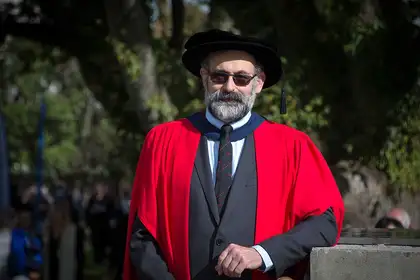
Professor Michael Roche, after his graduation with a Doctor of Literature.
The study of this country’s farming and forestry industries, and of the development of geography as a university subject in New Zealand, are themes at the heart of more than 30 years of academic work that earned geographer Professor Michael Roche a Doctor of Literature.
He was conferred with the degree at the Manawatū graduation ceremony for the College of Humanities and Social Sciences, home to the School of People, Environment and Planning where he is based.
His research, writing and academic interests span forestry policy in New Zealand since the 1840s; a critical look at a scheme to resettle returning soldiers from the First World War on farms, and how the development of geographic concepts has allowed us to interpret our changing landscape.
Professor Roche says the degree recognises the totality of his work on themes that are central to the New Zealand story. The dual histories of indigenous forest protection versus the commercial pursuit of introduced Pinus radiata forestry are intrinsic to our past and contemporary land use and policy debates.
Along with the establishment of scenic reserves, other writings examined “the considerable contemporary impact of Neoliberal policies in dramatically transforming state and corporate forestry in New Zealand.”
He wrote the 466-page History of New Zealand forestry (commissioned by the New Zealand Forestry Corporation and GP Books) in 1990. It explores of the origins and growth of the New Zealand timber industry beginning with the spar trade of the 1790s to 1840s, the emergence of regional timber industries to the evolution of a national timber industry in the late nineteenth century, the development of state forestry and the establishment of a plantation forest estate by the government and private sector.
New take on scheme to resettle WWI soldiers on farms
On another topic that embraces history as much as geography, his research challenged conventional wisdom about the failure of the Discharged Soldier Settlement Scheme. Introduced in 1915 under the Prime Minister-ship of William Ferguson Massey, it allowed the government to finance more than 9000 returned servicemen onto farms. Professor Roche examined the nature of ‘failure’ – due, in his view, to the small size of the farms, the poor land, plummeting meat and dairy prices and the Depression.
The scheme, he says “was not, as is generally imagined, completely unsuccessful.”
“There were some folk who did OK. So I think we should talk about the success, as well as failure. And the idea of what constituted ‘failure’ or ‘success’ for that matter has been explored only in very narrow terms,” says Professor Roche, who spoke to sons and daughters of soldiers who were part of the scheme.
His research on geographical thought has revealed how British and American ideas and personnel in the New Zealand landscape in the 1930s and 1940s gave a distinctive character to the inception of university geography in this country. New Zealand, from the perspective of a European geographer, was a paradise of uncharted diversity, “with everything from the sub-tropics to glaciers and volcanoes – all in a small area.”
Professor Roche is an historical geographer, a branch of the discipline concerned with understanding the geography of the past, and the influence of the past in the geography of the present and how it shapes the geography of the future.
He has been active in intellectual, public and governance bodies, including the New Zealand Geographical Society, the International Geographical Union, and the New Zealand Geographic BoardNgā Pou Taunaha o Aotearoa, which is New Zealand's national place naming authority. Work with the Board has included wide-ranging issues and decisions such as naming a feature in honour of Sir Edmund Hillary, recommending the return of the ‘h’ to Whanganui, and providing advice to the Office of Treaty Settlements on restoring Māori place names as part of Treaty of Waitangi settlements.
In his capacity as a member of the Undersea Feature Names sub-Committee of the Board, he’s worked with GNS and NIWA scientists in naming of undersea peaks in New Zealand’s maritime zone. The information is vital for coastal navigation and fisheries management and is “an interesting spin-off” for an otherwise terrestrial scholar.
The Degree of Doctor of Literature is awarded for the original contribution of special excellence to knowledge in the fields of Humanities or Social Sciences, published in the form of scholarly papers and/or books or creative works or performances.unc.